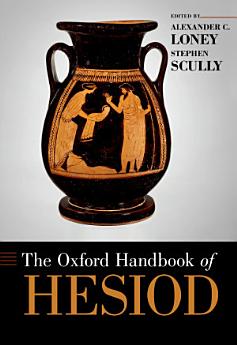The Oxford Handbook of Hesiod
Alexander Loney · Stephen Scully
Jul 2018 · Oxford University Press
E-Book
688
Seiten
family_home
Zulässig
info
reportBewertungen und Rezensionen werden nicht geprüft Weitere Informationen
Über dieses E-Book
This volume brings together 29 junior and senior scholars to discuss aspects of Hesiod's poetry and its milieu and to explore questions of reception over two and half millennia from shortly after the poems' conception to Twitter hashtags. Rather than an exhaustive study of Hesiodic themes, the Handbook is conceived as a guide through terrain, some familiar, other less charted, examining both Hesiodic craft and later engagements with Hesiod's stories of the gods and moralizing proscriptions of just human behavior. The volume opens with the "Hesiodic Question," to address questions of authorship, historicity, and the nature of composition of Hesiod's two major poems, the Theogony and Works and Days. Subsequent chapters on the archaeology and economic history of archaic Boiotia, Indo-European poetics, and Hesiodic style offer a critical picture of the sorts of questions that have been asked rather than an attempt to resolve debate. Other chapters discuss Hesiod's particular rendering of the supernatural and the performative nature of the Works and Days, as well as competing diachronic and synchronic temporalities and varying portrayals of female in the two poems. The rich story of reception ranges from Solon to comic books. These chapters continue to explore the nature of Hesiod's poetics, as different writers through time single out new aspects of his art less evident to earlier readers. Long before the advent of Christianity, classical writers leveled their criticism at Hesiod's version of polytheism. The relative importance of Hesiod's two major poems across time also tells us a tale of the age receiving the poems. In the past two centuries, artists and writers have come to embrace the Hesiodic stories for themselves for the insight they offer of the human condition but even as old allegory looks quaint to modern eyes new forms of allegory take form.
Autoren-Profil
Alexander C. Loney is Assistant Professor of Classical Languages at Wheaton College. Previously, he was an American Council of Learned Societies New Faculty Fellow at Yale University. He has written on Homer, Hesiod, and Greek lyric poetry, with a monograph on retributive justice in the Odyssey forthcoming with Oxford. Stephen Scully is Professor of Classical Studies at Boston University. He has written on Homer, Hesiod, Greek tragedy, Plato, Freud's antiquities, and receptions studies of Homer, Hesiod, and Vergil. Translations include Plato's Phaedrus (2003) and, with Rosanna Warren, Euripides' Suppliant Women (1995).
Dieses E-Book bewerten
Deine Meinung ist gefragt!
Informationen zum Lesen
Smartphones und Tablets
Nachdem du die Google Play Bücher App für Android und iPad/iPhone installiert hast, wird diese automatisch mit deinem Konto synchronisiert, sodass du auch unterwegs online und offline lesen kannst.
Laptops und Computer
Im Webbrowser auf deinem Computer kannst du dir Hörbucher anhören, die du bei Google Play gekauft hast.
E-Reader und andere Geräte
Wenn du Bücher auf E-Ink-Geräten lesen möchtest, beispielsweise auf einem Kobo eReader, lade eine Datei herunter und übertrage sie auf dein Gerät. Eine ausführliche Anleitung zum Übertragen der Dateien auf unterstützte E-Reader findest du in der Hilfe.





